Podcast
Questions and Answers
What does true love involve according to the content?
What does true love involve according to the content?
- Focusing only on superficial traits
- Celebrating social expectations
- Accepting someone as they truly are (correct)
- Accepting someone based on physical looks
What negative effect can incongruence have on an individual?
What negative effect can incongruence have on an individual?
- Increased self-confidence
- Stronger relationships with others
- Enhanced emotional intelligence
- Anxiety and psychological unhealthiness (correct)
What is the concept of 'conditions of worth' related to?
What is the concept of 'conditions of worth' related to?
- The acceptance of one's true self
- The need to gain love through achievements (correct)
- Embracing emotions openly in public
- Ignoring personal values to fit in
According to the content, how should we view our emotions?
According to the content, how should we view our emotions?
What is a consequence of trying to ignore one's true self?
What is a consequence of trying to ignore one's true self?
What should decisions be based on, according to the content?
What should decisions be based on, according to the content?
What does the term 'ideal self' refer to in the context of the content?
What does the term 'ideal self' refer to in the context of the content?
What outcome may arise from freely allowing the true self to grow?
What outcome may arise from freely allowing the true self to grow?
What does the base of Maslow's Hierarchy of Needs represent?
What does the base of Maslow's Hierarchy of Needs represent?
According to Carl Rogers' theory, what aspect of the self encompasses the goals and aspirations of a person?
According to Carl Rogers' theory, what aspect of the self encompasses the goals and aspirations of a person?
Which need must be fulfilled before an individual can achieve self-actualization according to Maslow?
Which need must be fulfilled before an individual can achieve self-actualization according to Maslow?
What is indicated by the term 'Congruence' in Rogers' theory?
What is indicated by the term 'Congruence' in Rogers' theory?
What aspect of the self involves the perception of oneself regardless of acceptance?
What aspect of the self involves the perception of oneself regardless of acceptance?
What is a key component that supports human growth as stated in the content?
What is a key component that supports human growth as stated in the content?
Which need is directly above the Love/Belonging level in Maslow's Hierarchy of Needs?
Which need is directly above the Love/Belonging level in Maslow's Hierarchy of Needs?
What does the True Self represent in Carl Rogers' theory?
What does the True Self represent in Carl Rogers' theory?
What aspect does the discussion suggest should be evaluated when experiencing failure?
What aspect does the discussion suggest should be evaluated when experiencing failure?
Which of the following contrasts are part of the humanistic approach mentioned?
Which of the following contrasts are part of the humanistic approach mentioned?
What does the mention of the 'little child' imply regarding personal development?
What does the mention of the 'little child' imply regarding personal development?
What element is highlighted as a potential influence on decision-making according to the psychodynamic view?
What element is highlighted as a potential influence on decision-making according to the psychodynamic view?
In what way does the humanistic approach differ in its view of social media addiction?
In what way does the humanistic approach differ in its view of social media addiction?
Which of the following best describes the concept of 'ideal image' in relation to significant others?
Which of the following best describes the concept of 'ideal image' in relation to significant others?
What is the suggested understanding of emotions in the discussion?
What is the suggested understanding of emotions in the discussion?
Which of the following perspectives is NOT explicitly mentioned in the document regarding societal influences?
Which of the following perspectives is NOT explicitly mentioned in the document regarding societal influences?
What is a significant factor that affects academic performance?
What is a significant factor that affects academic performance?
How is creativity developed according to the content?
How is creativity developed according to the content?
What is indicated as a necessary action when we make mistakes?
What is indicated as a necessary action when we make mistakes?
What does the content suggest about love?
What does the content suggest about love?
What should be emphasized to grow as a person?
What should be emphasized to grow as a person?
What is the primary capacity of the brain mentioned in the content?
What is the primary capacity of the brain mentioned in the content?
What is suggested as an important aspect of consistent academic performance?
What is suggested as an important aspect of consistent academic performance?
How does the content describe mistakes?
How does the content describe mistakes?
What is an essential element of maintaining good social relationships according to the context?
What is an essential element of maintaining good social relationships according to the context?
Which role in a group discussion is responsible for guiding the conversation?
Which role in a group discussion is responsible for guiding the conversation?
What is highlighted as a benefit of accepting oneself and others in relationships?
What is highlighted as a benefit of accepting oneself and others in relationships?
What is indicated as the best kind of support one can provide to a friend?
What is indicated as the best kind of support one can provide to a friend?
Why is it important to create a healthy support system?
Why is it important to create a healthy support system?
What does the author imply is often hidden behind our social masks?
What does the author imply is often hidden behind our social masks?
Which of the following is considered a key aspect of empathy in the context provided?
Which of the following is considered a key aspect of empathy in the context provided?
In the group activity, what is the primary function of the reporter?
In the group activity, what is the primary function of the reporter?
Study Notes
Maslow's Hierarchy of Needs
- Maslow's Hierarchy of Needs is a psychological theory that states that humans are motivated to fulfill their needs in a hierarchical order.
- The hierarchy is arranged in a pyramid, with the most basic needs at the bottom and the most advanced needs at the top.
- The needs at the bottom of the pyramid must be satisfied before we can move on to the next need.
- The order of the needs from bottom to top are as follows:
- Physiological: food, water, health, etc.
- Safety: free from harm, danger, fear, anxiety, etc.
- Love/Belonging: having good relationships with friends, family, and significant others.
- Esteem: achievement, competence, self-respect
- Self-Actualization: fulfillment of inner potential
Carl Roger's Self Theory
- Carl Roger's Self Theory states that each person has a few "selves" that differ from each other.
- There are three selves:
- The Ideal Self: who the person wishes they were.
- The Self-Image: who the person thinks they are.
- The True Self: who the person really is.
- Ideally, a healthy individual accepts who they really are and moves freely towards who they wish to be. This is known as Congruence.
- An unhealthy individual rejects who they really are and is dictated by an ideal self that is much too harsh and not something they personally chose. This is known as Incongruence.
- Incongruence can occur due to Conditions of Worth, where people learn they must work for love and acceptance. This leads to denial of the True Self.
Humanistic Approach and Processing
- The Humanistic approach to psychology emphasizes the importance of the individual's subjective experience and freedom of choice.
- Processing questions are designed to encourage individuals to reflect on their personal experiences and beliefs.
- The Humanistic approach emphasizes the importance of each individual's unique experiences and how these impact their understanding of the world.
- It suggests that our behavior is determined by our individual choices, not by external forces, and that we have the potential for growth and self-actualization.
- The Humanistic approach is used in various fields, including education, psychotherapy, and social work, and contributes to our understanding of human behavior and its complexities.
NCOFI - Nature vs Nurture, Conscious vs Unconscious, Observable vs Internal, Free Will vs Determinism, Individual vs Universal
- This is a framework used to understand the complexity of human nature.
- The Humanistic approach prioritizes the "Individual" within this framework.
- The understanding of the Individual is often used in combination with the principles of "Free Will," "Internal," and "Conscious."
- The Humanistic approach emphasizes the importance of considering the individual's unique experiences and perspectives.
Love and Relationships
- Love is a complex emotion that can arise through proximity and chance.
- We often develop love and attraction to those we are closest to physically.
- We learn to love ourselves by surrounding ourselves with people who accept us for who we truly are, regardless of our physical appearance or adherence to social expectations.
- Learning to accept ourselves for who we are is critical for personal growth and emotional well-being.
Overcoming Failure
- Failure is a learning opportunity.
- When we experience failure, we should be kind to ourselves, and understand that our brains are capable of adapting and learning from our mistakes.
- It is important to not be overly critical of ourselves, but focus on what we can do better in the future.
Creativity
- Creativity is a matter of experience.
- Our brains are capable of learning and combining experiences to develop novel and creative ideas.
- We must expose ourselves to different experiences and ideas to enhance our creative potential.
Empathy and Understanding
- Empathy and understanding are essential for nurturing healthy relationships.
- Developing empathy allows us to better understand the perspectives of others and offer them support.
- A supportive environment allows us to create a safe space for ourselves to explore new ideas and express our true selves.
Studying That Suits You
Use AI to generate personalized quizzes and flashcards to suit your learning preferences.
Related Documents
Description
Explore the concepts of Maslow's Hierarchy of Needs and Carl Rogers' Self Theory in this engaging quiz. Test your understanding of these foundational psychological theories and their implications for personal development. Dive into the motivations behind human behavior and the structure of self-perception.




